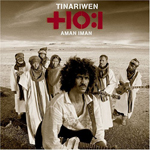 The liner notes for Tinariwen’s third record, Aman Iman: Water is Life, read like a story in National Geographic. Photos of a wild-haired, stick-thin man in an indigo robe with a guitar decorate each page and the story goes like this: Somewhere under a tent in a desert town in Kidal, a group of Touregs passed around a shoddy electric guitar hooked up to a battery-powered amp and sang ever-changing ancient songs.
The liner notes for Tinariwen’s third record, Aman Iman: Water is Life, read like a story in National Geographic. Photos of a wild-haired, stick-thin man in an indigo robe with a guitar decorate each page and the story goes like this: Somewhere under a tent in a desert town in Kidal, a group of Touregs passed around a shoddy electric guitar hooked up to a battery-powered amp and sang ever-changing ancient songs.
Fueled by strong black tea, bread baked in the sand, and day-to-day struggles, a band called Tinariwen was formed from the nights of passing that one guitar around a fire. The band serves as the bold voice of the Tamashek people and you can hear it vividly in each song on this album.
Every member of Tinariwen has an interesting tale. Just to name a few, Ibram, the lead vocalist and guitarist, is known to sit on a bare mattress under the stars playing late into the night, his smooth voice echoing through the eerily empty desert. Abdallah, like many Touregs, didn’t see his first electric light until age sixteen and now tours country to country with the band. Japonais, who sings on key tracks of the album, is one of the most well-known poets of their language.
The lyrics are printed in three different ways – in English, phonetically, and in Tifinar, one of the oldest alphabets in the world still used daily. Every song is about exile and unity, death and drought, political ignorance, and tribal rivalies.
Despite the language barrier, the album is alarmingly candid and borderline sacred sounding. Some songs are haunting and slow, some sound almost like American blues, and there are a handful of vigorous folk rock songs that never stray from their African roots. All songs have a steady beat of hand drums and a chorus of women and children in the background that leave you with a nostalgic feeling for tribes snuffed out by the modern world.
– Sharyn Goldyn
Tinariwen (World Village)
